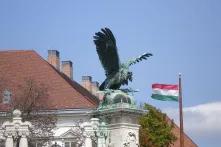Why the Russian regime and the Hungarian far right are in an intimate relationship: a new study by Political Capital and Social Development Institute.

If one examines Vladimir Putin’s statements and political initiatives, the first impression is that no actor in Europe is more dedicated to pushing back the far right than he is. Putin has warned several times that the far right and neo-Nazism are on the rise in Europe, and Russia has even raised this issue at the United Nations, calling for joint action against the spectre of fascism returning to Europe. Russian state media always cover right-wing provocations and demonstrations as part of a worrisome trend.
But real circumstances call into question the sincerity of the Russian government's often-expressed anxieties over Europe’s ascendant far right and Moscow's determination to help Europe overcome the challenges they pose. Instead, it seems that Russia is happy to lend political, diplomatic and sometimes even financial support to radical right-wing parties across Europe in order to destabilise the EU from within, to use them to spread propaganda and conspiracy theories advocated by the Kremlin, and even to find allies to help legitimise the Russian regime from outside.
A case in point is the Hungarian far right and its main political grouping, Jobbik, currently the second-strongest party in Hungary with prospects to top the opinion polls as the popularity of the governing Fidesz erodes. A study by Political Capital Institute and Social Development Institute, supported by the Heinrich Böll Foundation, reveals the extensive ideological, personal and political links between the Russian regime and Jobbik, a party that servilely supports Vladimir Putin itself. This most extensive research on these connections so far was conducted in cooperation with András Dezső, an investigative journalist for Hungary’s most popular news site, index.hu and is the first in a series of similar reports on various EU Member States.
Jobbik, a rising star of the European radical right-wing
While the Orbán cabinet pursues a pendulum policy towards Russia, it is of utmost importance for the Kremlin to exert influence on the Hungarian far right and especially on Jobbik, a rising star of the European radical right-wing scene infamous for its earlier antisemitic statements and currently moderating its radical messages to contender for participation in a future government. Certainly, the Kremlin has a vested interest in pushing the political spectrum both towards more Kremlin-friendly positions and towards inciting more public discontent with the West. In so doing, the government in Moscow aims to apply indirect pressure on the Hungarian government, but also to destabilise the European Union and the region in general.
In ideological terms, such efforts fall on fruitful ground: Hungarian far right's enthusiasm can be easily explained by its opposition to the EU, antagonism towards the West and the U.S. as well as Vladimir Putin’s authoritarian and conservative views. But they cannot be explained by the views of Hungary’s right wing voters. Such positions have not and still do not characterise a majority of the Hungarian electorate, or indeed even a majority of far-right supporters. According to a Medián survey conducted at the end of 2014, 48 percent of Jobbik voters would side with the United States, and only 27 percent would support Russia.
Jobbik’s policy to serve Russian interests is thus not motivated by its support base, and must be explained by other factors. It was revealed recently that France’s National Front receives Russian funds in the form of a bank loan. Jobbik’s murky financial background prior to 2010, the surprising pro-Russia turnaround by media close to Jobbik circa 2008 and the funds provided to the party by its own MEP, Béla Kovács, who has been accused of spying for Moscow, all raise similar suspicions.
Not merely platonic love
The Russian leadership and the media close to the Kremlin use Jobbik and its leaders specifically to promote the Kremlin’s current policy objectives and to support its anti-EU campaign. Béla Kovács served as an observer during Russia’s 2012 presidential election and during the referendum on Crimea’s status, while two Jobbik MPs, Márton Gyöngyösi and Adrienn Szaniszló, were among the far-right European politicians who helped legitimise the status referendums in Donetsk and Luhansk through their participation as “observers”.
While Jobbik politicians emphasise Hungary’s neutrality when it comes to the Ukraine-Russia conflict, their own position on the issue is identical to that of the one-sided Russian state media. Jobbik has repeatedly tried to pressure the Hungarian government to shirk its EU and NATO obligations, which in this case involve taking a harder line against Russia. The referendum initiative on Hungary’s neutrality in the Ukraine-Russia conflict and even hints at the possibility of leaving NATO initiated by Jobbik in February 2015 serve the same goal in part. While Jobbik continues to criticise the EU, Béla Kovács has suggested that Hungary should join the Eurasian Union. When it comes to energy policy, the party regularly backs measures in both the European Parliament and Hungary’s National Assembly that are in line with the Kremlin’s interests.
These efforts clearly aim at maintaining and increasing Hungary’s dependence on fossil fuels and nuclear power from Russia. Of course, while uncritically representing Russian interests, Jobbik continues to refer to Hungarian interests. But this is not merely platonic love: Jobbik party leader Gábor Vona has visited Moscow several times, and is always received by high-level Russian stakeholders and diplomats – a rare privilege for him given that even the Western European far-right parties refuse to cooperate with Jobbik.
Russian influence also extends visibly to paramilitary organisations to the right of Jobbik. The general tendency is that the further beyond the political mainstream an organisation and its infrastructure are, the easier it is for the Russian regime to exert influence.
Read more:



